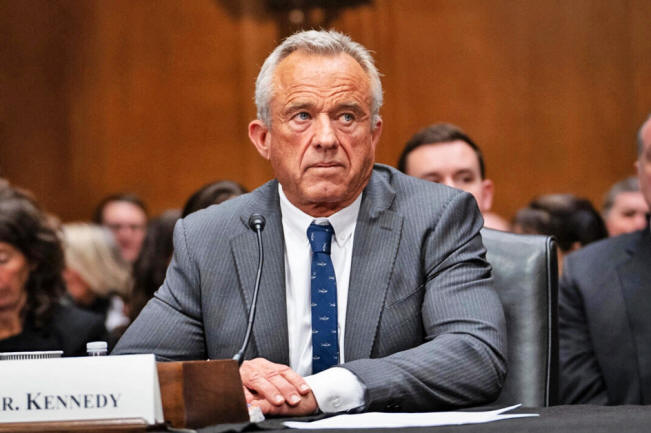|

by Zachary Stieber
Senior Reporter
March 27, 2025
from
TheEpochTimes
Website

Robert F. Kennedy Jr.,
nominee
for secretary of Health and Human Services,
testifies
before the Senate Committee on
Health,
Education, Labor, and Pensions
on Capitol Hill
on Jan. 30, 2025.
Madalina
Vasiliu/The Epoch Times
Approximately a quarter
of
Department of Health
and Human
Services staff members
are being
laid off...
Robert F. Kennedy Jr., secretary of the Department of
Health and Human Services (HHS), on March 27 announced major
changes at HHS, including the merging of some divisions, in a bid to
become more efficient.
"We are going to streamline HHS to make our
agency more efficient and more effective," Kennedy
said in a video statement.
The other goal is to improve the quality of
service.
Kennedy said that, in addition to consolidating divisions, mass
layoffs would reduce the full-time HHS workforce by about 25 percent
from 82,000 workers.
Kennedy said the transition will be painful but that the department
is,
"going to do more with less."
The reorganization, which will take 28 divisions
down to 15, is expected to save $1.8 billion per year, according to
health officials.
The division that will be most affected is
the Food and Drug Administration (FDA), with about 3,500
workers being fired, according to HHS.
The Centers for Disease Control and
Prevention's (CDC) workforce will be reduced by about 2,400
employees.
Some 1,200 employees at the National
Institutes of Health (NIH) will no longer have jobs.
The Centers for Medicare and Medicaid
Services, another division, will move forward with about 300
fewer workers.
HHS said in a statement that many of the
divisions contain "redundant units."
Officials are going to consolidate the units into
15 divisions.
One new division, the Administration for a
Healthy America, will feature five former divisions,
including the Health Resources and Services Administration and
the Substance Abuse and Mental Health Services Administration.
The Administration for Strategic Preparedness and Response,
which is responsible for responding to public health emergencies
and national disasters, will be folded into the Centers for
Disease Control and Prevention.
The Office of the Assistant Secretary for Planning and
Evaluation will merge with the Agency for Healthcare
Research and Quality to form the Office of Strategy,
with a focus on enhancing research,
"that informs the Secretary's policies
and improves the effectiveness of federal health programs,"
according to HHS.
Work currently carried out by the
Administration for Community Living, which helps older people
and individuals with disabilities, will be redistributed to
other agencies, including the Centers for Medicare and
Medicaid Services.
The agency's regional offices will also be
reduced from 10 to five.
The HHS Office of General Counsel previously
stated that it was closing six of its 10 regional offices.
The reorganization, spurred by President
Donald Trump's order to
agencies to initiate mass terminations, will not affect key
services, such as Medicare and Medicaid, HHS stated.
Some criticized the announcement.
Rep. Gerald Connolly (D-Va.), the top
Democrat on the House Oversight Committee,
said in a statement on social media
platform X that the cuts are,
"a grave mistake."
"I have serious concerns about how this will impact Americans'
well-being now and long into the future," he wrote.
National Treasury Employees Union President
Doreen Greenwald said the cuts would have a devastating
effect on public health services across the country.
"The administration's claims that such deep
cuts to the Food and Drug Administration and other
critical HHS offices won't be harmful are preposterous," she
said in a statement.
"These attempts to lay waste to the federal
government jeopardize our nation's ability to protect and serve
its own citizens."
Others expressed cautious optimism.
"I am interested in HHS working better, such
as lifesaving drug approval more rapidly, and Medicare service
improved," Sen. Bill Cassidy (R-La.)
wrote on X.
"I look forward to hearing how this
reorganization furthers these goals."
HHS has already fired about 3,200 probationary
workers, or newer employees, according to court filings.
HHS was among the agencies that were recently
ordered to reinstate those workers.
Other workers accepted the Trump
administration's buyout offer, which let workers go on paid
leave until September 2025 or take early retirement, HHS stated
on March 27.
About 10,000 additional employees will be terminated, according
to the department. Once complete, the restructuring will leave
HHS with a workforce of about 62,000.
The HHS budget increased by about 38 percent from
2021 to 2025, Kennedy said, while staffing went up by 17
percent during that time.
"But all that money has failed to improve the
health of Americans," he said.
Kennedy cited the growth in the rate of
chronic disease and cancer, as well as a lower life
expectancy for Americans when compared with Europeans.
Kennedy said he has found that HHS is,
"mainly operating in silos," with some
divisions working "at cross-purposes with each other."
"A few isolated divisions are neglecting public health
altogether and seem only accountable to the industries that
they're supposed to be regulating," Kennedy said, without naming
the divisions.
He also said that, in one instance,
"defiant bureaucrats impeded the secretary's
office from accessing the closely guarded databases that might
reveal the dangers of certain drugs and medical interventions."
HHS did not respond to requests for more
information.
|


